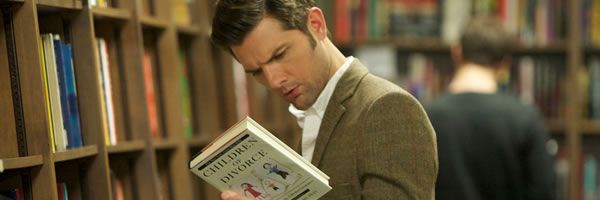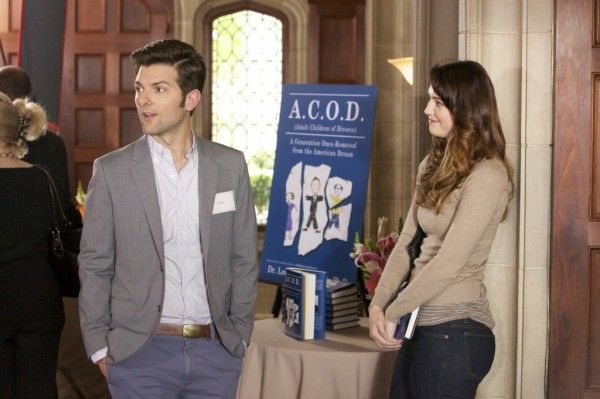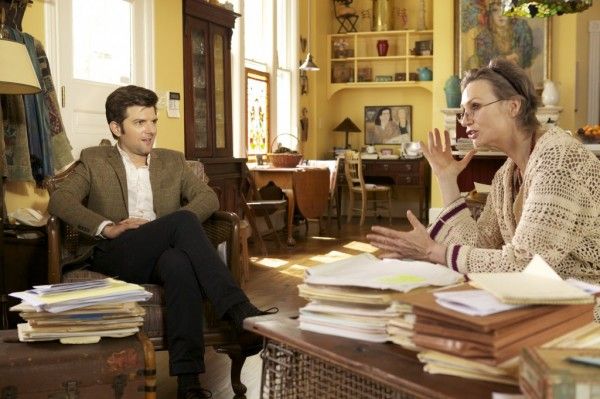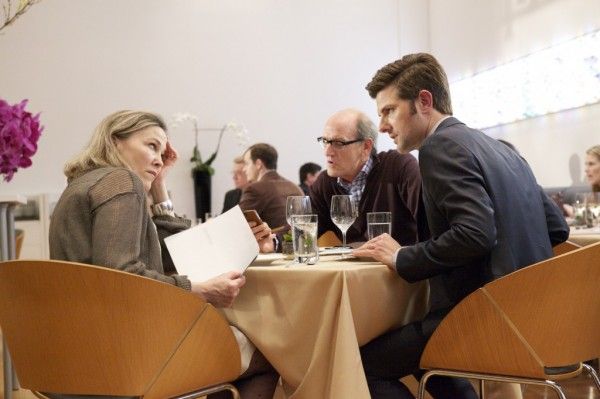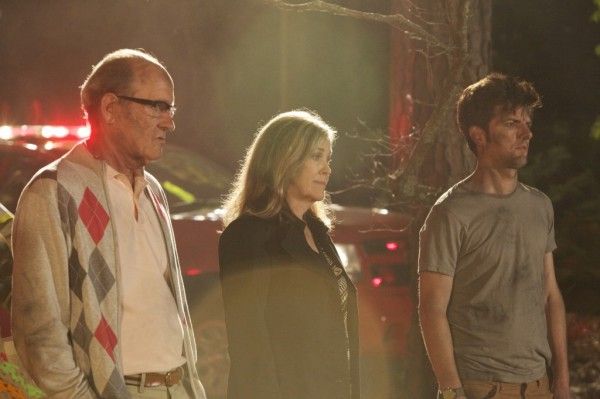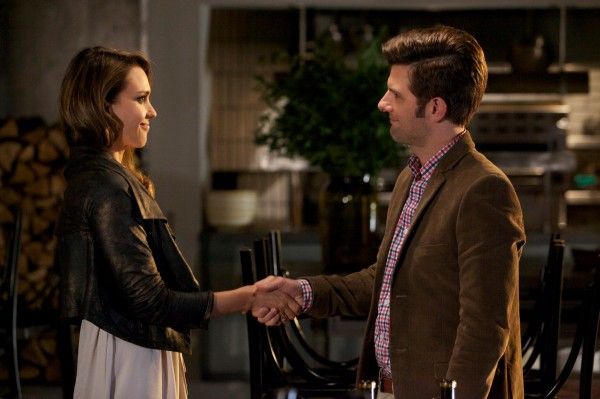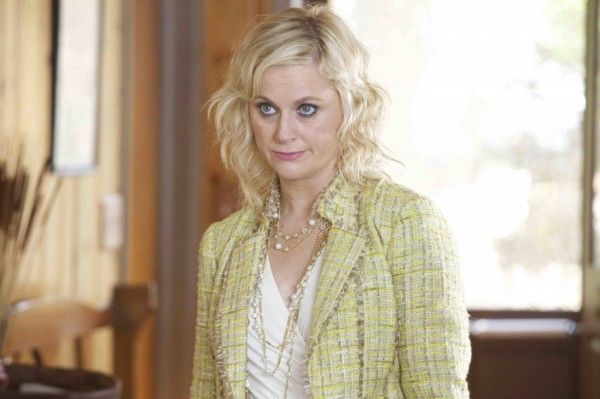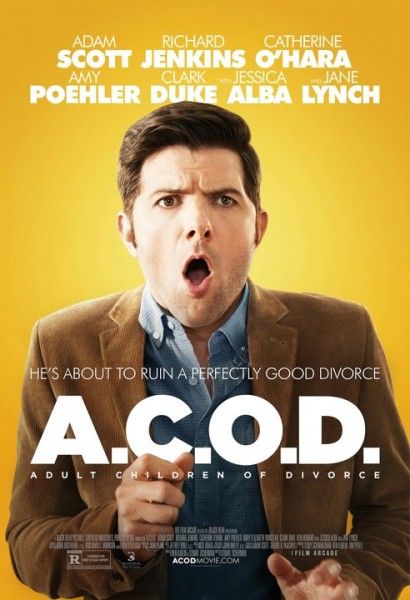In his feature directorial debut, Stu Zicherman’s hilarious new comedy A.C.O.D. captures in broad strokes the experiences of a generation that grew up with divorce being the norm, not the exception. Based on a script Zicherman co-wrote with Ben Karlin, the film focuses on a successful Adult Child of Divorce (Adam Scott) who survived his chaotic childhood but is now forced to get his bitterly divorced parents (Richard Jenkins, Catherine O’Hara) and their new spouses (Amy Poehler, Ken Howard) in the same room for his younger brother’s wedding. Opening October 4th, A.C.O.D. features a terrific cast that also includes Jessica Alba, Clark Duke, Jane Lynch, and Mary Elizabeth Winstead.
At the film’s recent press day, Zicherman and Karlin talked about how the story was inspired by their childhood friendship and their parents’ divorces, how audiences will find it relatable, why the movie took so long to get made, how they view it as an anti-romantic comedy, the advantages of making it independently, how they avoided the obvious comedic tropes to make a film that’s funny but also has some gravity, why they left the ending deliberately open-ended, their excitement at seeing it finally reach the screen, their work on Modern Family and The Americans, and why movies are trickier than writing for television. Hit the jump to read the interview.
Question: Can you tell us about the genesis of this story?
STU ZICHERMAN: Ben and I have actually been friends since we were born. What’s the quickest way to explain this? Basically, my mom was friends with Ben’s parents, and Ben’s parents were friends with my mom’s first husband who I didn’t even know about. We’ve been friends our whole lives. I have always wanted to do something with this subject matter, this generation of divorced kids. We’re both part of this generation.
BEN KARLIN: Yeah. We were friends growing up and our families were friends growing up, but then, when his parents got divorced and shortly thereafter my parents got divorced, we stopped hanging out that much because that was the end of our families getting together and doing things.
ZICHERMAN: It was a very romantic journey where our families used to go on vacations together.
KARLIN: So when we were both professional and we were established as adults in our careers, I moved to New York, and Stu was working there already and he said, “Hey, I want to write a movie about how messed up we all are.” (They both laugh) I went, “I’m in!”
ZICHERMAN: We grew up on movies like Kramer vs. Kramer and dramas that were kind of tragic. Ben and I talked about this when we first started working on the movie. Our parents’ divorces were tragic and sad in their own way, but they were also not to be believed at times. (laughs) They were irreverent, funny and weird. We wanted to try and find a way to make light of it and make a comedy that still had some gravity to it because it’s something that people don’t laugh about. What’s been really fun about making this movie and about taking it around and showing it at Sundance and all these places is that people are excited and relate to it. People will come up to me after screenings and want to tell their stories like, “My parents got divorced when I was 8.” We’re almost giving them license to laugh about it.
Do you ever have to tell them, “Listen, I’m not actually here to…”?
ZICHERMAN: Yeah. (laughs) “I’m not a therapist. I can’t help you.”
That’s what you have Jane Lynch for.
ZICHERMAN: Exactly.
KARLIN: We were shooting in Atlanta, and the night before production started, it was just us. It was me, Stu, a couple of the actors, a couple of the producers, and we were out in the bar at the hotel. There was a wedding going on and there was the after party for the wedding. There was the groom, the bride, the whole bridal party. Everyone was in tuxedoes. So it was like these two worlds. We were about to make this movie about divorce and these people who were just starting. And they were great. They were lovely people. We closed the bar down with them. And then, a week later, I got a letter from one of the bridesmaids who I had been chatting with, and she told me this long story about her family’s divorce and how it affected her. It was just so weird. Even in that moment, people were just connecting to what we were trying to do, and we found that throughout the whole process, that there seems to be something that everyone can relate to about this subject.
The looming question that everyone has is who got married?
ZICHERMAN: (laughs) At the end?
Yes, even your actors don’t know.
ZICHERMAN: Well, you know, we didn’t really want to give it away. Ben and I always talked about the movie as being an anti-romantic comedy. There were certain beats we would get to in the movie as we were writing it. There’s the obvious romantic comedy beat. We were trying to turn away from that wherever we could, not to the detriment of the movie, but the end of the movie was not so much about who got married. It was more important to us that the characters, especially those three men, have evolved through the movie to a point where it could be any of them. When pressed, I always say it’s all three of them, but we like the idea of leaving it open-ended because it didn’t matter.
KARLIN: It didn’t really trouble us, I have to say. We wanted to create a scenario where all three characters were repaired to the point where you’d be just okay with any of them. And it could be all three of them or none of them. The point is that whatever was waiting for them in there (in the church) was okay.
ZICHERMAN: And it’s funny too, when editing the movie, every single time I would adjust frames or tried a different shot and put it in front of an audience, people always guessed a different person. It was bizarre. I started to lose track of why people felt what. We had to calibrate it so that it’s pretty hard to tell now. We’d had a version where there was a faceless bride running through the background.
KARLIN: Oh, deep, deep background. A limo, a bride, the whole thing.
ZICHERMAN: Again, it distracted from the movie. It’s such a nice, clean moment with the three of them walking in, and we like it.
That story that Richard Jenkins’ character tells at the end is fantastic.
ZICHERMAN: (laughs) Yeah.
KARLIN: Loosely, very loosely based on my father minus a significant part.
The fact that everybody asks questions and has their own version of the ending and who got married is a testament to your writing of the characters because we’re all so invested with every one of them that we want to know what happens.
KARLIN: It’s a very hard thing to do. You want to give in. You want to give people what they want. And then, there’s the creative jerk part of you that’s like, “I know better.” (laughs)
ZICHERMAN: But also, we thought about a lot of this when we were writing the movie that we didn’t want people to be right or wrong. It’s not a right or wrong thing. It’s the dad who does this impetuous thing and they get back together. He’s not wrong. He’s following his heart. What’s wrong with following your heart? And again, at the end of the movie, I always say to people it’s not a movie about divorce per se. I don’t want people just to think it’s about that. It’s really about if you’re married, if you’re not married, divorced, whatever kind of family you’re from, you’re not destined to repeat the patterns of your parents. You’re free to make your own mistakes. You’re free to live your life. That’s why I always love the word “adult” being in the movie. I always felt like you become an adult when you actually can put your past into perspective. That’s when you really start becoming an adult. And I like that about the ending.
Because up to that point, everybody is acting like a child.
ZICHERMAN: Yeah. (laughs) Oh no, they always do that. That never ends.
You said it was loosely based on your families. Have you gotten any flak from any family members?
KARLIN: We’ve done a pretty good job of hiding or changing details. There used to be more stuff in the script that was literally word for word from our lives. There was an incident in his family and a specific incident in mine that involved the handing off of kids on a bridge, like a prisoner transfer, but it was between the parents. And it literally, at this moment, happened to me in Cape Cod where it was my dad’s new wife actually and her children and her ex-husband, and they had to exchange and they decided the exact mid-point. It was like North Korea-South Korea. Here’s the DMZ and we’re going to trade these children over that line, and we had that exact scene in the movie for years. That probably wouldn’t have gone over so well.
ZICHERMAN: And then, there was a thing in my family called the hysterectomy conspiracy that was so absurd that when it was in the script, people would read it and be like…
KARLIN: “That’s not real.”
ZICHERMAN: They didn’t believe it. “No, no. It’s real.” We had to take it out because people didn’t believe it. But that happened to me. There’s one moment in the movie that is sort of torn from my life and it’s funny. It’s the one where Carter sits his parents down. My sister was getting married, and my parents would not agree to come to the same wedding. My brother-in-law and I sat them down. What’s hilarious about that is my parents don’t remember that. They block it out.
So they’ll think you just wrote it?
ZICHERMAN: Exactly!
It’s amazing how selective memory is.
KARLIN: Yes. Exactly.
Adam Scott mentioned he saw the script years ago, and you said you’ve been working on this for years. How long did it take you to get this film made?
KARLIN: Oh my God! I was just talking about this the other day. We started working on this movie… I was living here and I moved to New York in 1999, and Stu was already living there at that time. He probably approached me in 2000 or 2001 to start working on it. Obviously, we had other jobs.
ZICHERMAN: Yeah. We had other jobs, so we were working on it nights and on weekends and vacations.
KARLIN: The amazing thing is we were both single when we started working on this movie. I have since gotten married, had children, and gotten divorced. (laughs)
ZICHERMAN: (laughs) No. It’s crazy. We were both single when we started this thing, and now I’m married with two kids and he’s got two kids, which I think helped inform the movie a little bit.
KARLIN: Yes. Definitely.
ZICHERMAN: It’s been a long process. It’s funny though. The movie almost got going at one point. It came really close to get going. What was great about it was once we committed to Adam, the movie started to finally roll. Finally, eventually, you get so frustrated with all the games you have to play to try and get a movie made. The thing is that we always loved Adam for this. And again, it fits in a little bit with the anti-romantic idea. He’s got an anti-romantic lead in a way because he’s got a very cynical humor and perspective on life. It just worked really well. And once we got Adam, then we got Richard (Jenkins). It just started to roll.
KARLIN: Once you have those first few pieces in place, it starts to gain a terminal velocity.
ZICHERMAN: Right. The phone starts to ring and all of a sudden people want to be in your movie. That was very exciting.
What I like about the script is that you don’t know where it’s going to go. From a distance, it looks like your typical formulaic comedy, but it really isn’t. How did you go about that? Were you looking to avoid certain things that you see in a lot of comedies like this?
KARLIN: Yes. There are so many tropes to these kinds of movies. Because we always were around, we were like, “How do we deal with the subject of a wedding in a movie that’s essentially about divorce?” We were very resolute that if we were going to have a wedding, we were going to do it differently than that typical moment at the end of the movie where people are walking down the aisle. So we knew we wanted that outside the wedding moment to end it. We just were acutely aware of convention and trying to understand why those conventions worked and why they existed, and then trying wherever we could to tiptoe around the obvious thing.
ZICHERMAN: But the big thing was stakes. I mean, there were so many times where we were hyperconscious with the movie, and we would do readings just to find out where we were with it. The main character, Carter, is in every single scene of the movie and he doesn’t have cancer. He isn’t beaten. It’s the kind of thing, at a certain point, where the audience could be looking at him and go, “Hey dude, get over it.” And so, there were scenes we really liked but we felt like we were going to lose the audience. We said, “We have to keep the audience rooting for him.”
KARLIN: We didn’t want to turn the guy into a jerk.
ZICHERMAN: So it was this balance. At times, people would read the script and say, “Why doesn’t he want his parents to get back together?” We just had to find a way and we kept trying to find ways in through relationships. But we did at times always try to move away from the tropes like the scene with the ring that turns into the key, and moments like that. It was funny. I did a Q&A in New York the other night and someone asked me about the whole cheating thing with Jessica and how he never gets caught.
In the classic romantic comedy, you always get that scene where she’s like, “What were you doing with that girl?” It never crossed our minds to go there, and the truth is because in real life most people don’t get caught. You’re just forced to live with it. And that was the great liberty of making this movie independently. We’re not beholden to a studio to hit certain tropes. Also, it made the tone what it is, because the movie is funny but it’s also got some gravity to it and it’s got this balance.
I want to know from Ben where’d you put the latest Emmy Award?
KARLIN: I’m wearing it right now actually. It’s actually the least insertable award, you should know. (laughs) No.
It is rather dangerous.
KARLIN: It’s on a shelf.
What’s next for both of you?
KARLIN: Well, I work on Modern Family so I’m a co-executive producer of that show. I’m in my third year and I enjoy it. It’s my day job, I guess. (laughs) I love doing movies, but as a writer, the movie business is trickier as a writer. There’s just so much more steady work in television as a writer. And even Stu, who started out as a screenwriter, moved over to TV because it’s just where it’s at. It’s great now, too, by the way. There’s so much great television as much as movies are great.
ZICHERMAN: Ben’s on Modern Family and I’m on Season 2 of The Americans which is an FX show and is also a show about marriage. (laughs)
KARLIN: (laughs) They all are.
ZICHERMAN: I’m excited. The fact that the movie is finally coming out, I’m excited for people to see it, but I’m also going to miss it because we’ve just been carrying it around like this for so long.

